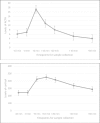Exercise training and physiological responses to acute stress: study protocol and methodological considerations of a randomised controlled trial
- PMID: 30167319
- PMCID: PMC6109819
- DOI: 10.1136/bmjsem-2018-000393
Exercise training and physiological responses to acute stress: study protocol and methodological considerations of a randomised controlled trial
Abstract
Background: This paper describes the protocol and methodological prerequisites for a randomised controlled exercise intervention. Selected baseline data from the study are also presented, demonstrating some methodological challenges related to exercise intervention trials. The aim of the trial was to study the effects of exercise training on physiological responses to acute psychosocial stress in untrained individuals.
Methods: Individuals with a low level of physical activity were invited to participate in an exercise intervention lasting for 6 months. A total of 119 participants were included and went through a peak oxygen uptake test and a psychosocial stress test at baseline. Adrenocorticotropic hormone (ACTH) and cortisol were measured in connection to the stress test to identify the physiological response.
Results: Almost 90% of the participants reported themselves as untrained, but results from the objectively measured oxygen uptake did not seem to correspond to the reported sedentary lifestyle. The primary outcome measures at baseline varied between individuals. The mean change from pre-test to peak value was 214% for ACTH and 94% for cortisol. Of these, 13 individuals did not respond in ACTH and/or and cortisol.
Discussion: Supposedly untrained individuals seeking participation in an exercise intervention might not be as untrained as they report, a methodological consideration of importance when evaluating the effects of training. Another important consideration is related to the primary outcome measure, which should be measurable and possible to affect. Absence of reaction at baseline means that changes can only be detected as an increased reaction.
Keywords: longitudinal study; physical activity; psychosocial stress.
Conflict of interest statement
Competing interests: None declared.
Figures
Similar articles
-
The effects of exercise training on hypothalamic-pituitary-adrenal axis reactivity and autonomic response to acute stress-a randomized controlled study.Trials. 2020 Oct 27;21(1):888. doi: 10.1186/s13063-020-04803-3. Trials. 2020. PMID: 33109273 Free PMC article. Clinical Trial.
-
Plasma cortisol and ACTH concentrations in the warmblood horse in response to a standardized treadmill exercise test as physiological markers for evaluation of training status.J Anim Sci. 2000 Jul;78(7):1936-46. doi: 10.2527/2000.7871936x. J Anim Sci. 2000. PMID: 10907837
-
Adrenocorticotropic hormone/cortisol response to physical exercise in abstinent alcoholic patients.Alcohol Clin Exp Res. 2007 May;31(5):901-6. doi: 10.1111/j.1530-0277.2007.00376.x. Epub 2007 Mar 26. Alcohol Clin Exp Res. 2007. PMID: 17386066
-
Trained versus untrained men: different immediate post-exercise responses of pituitary adrenal axis. A preliminary study.Eur J Appl Physiol Occup Physiol. 1997;75(4):343-50. doi: 10.1007/s004210050170. Eur J Appl Physiol Occup Physiol. 1997. PMID: 9134366
-
Effects of Small-Sided Soccer Games on Physical Fitness, Physiological Responses, and Health Indices in Untrained Individuals and Clinical Populations: A Systematic Review.Sports Med. 2020 May;50(5):987-1007. doi: 10.1007/s40279-019-01256-w. Sports Med. 2020. PMID: 31989457
Cited by
-
Differential impact of stress and environmental enrichment on corticolimbic circuits.Pharmacol Biochem Behav. 2020 Oct;197:172993. doi: 10.1016/j.pbb.2020.172993. Epub 2020 Jul 11. Pharmacol Biochem Behav. 2020. PMID: 32659243 Free PMC article. Review.
-
The effects of exercise training on hypothalamic-pituitary-adrenal axis reactivity and autonomic response to acute stress-a randomized controlled study.Trials. 2020 Oct 27;21(1):888. doi: 10.1186/s13063-020-04803-3. Trials. 2020. PMID: 33109273 Free PMC article. Clinical Trial.
-
Role of exercise on the reduction of cancer development: a mechanistic review from the lncRNA point of view.Clin Exp Med. 2025 Mar 10;25(1):77. doi: 10.1007/s10238-025-01618-x. Clin Exp Med. 2025. PMID: 40063304 Free PMC article. Review.
-
Stressor-Induced Temporal Cortisol Deficiency as a Primary Trigger for Adaptation to Stress.Int J Environ Res Public Health. 2022 May 5;19(9):5633. doi: 10.3390/ijerph19095633. Int J Environ Res Public Health. 2022. PMID: 35565026 Free PMC article.
References
LinkOut - more resources
Full Text Sources
Other Literature Sources


